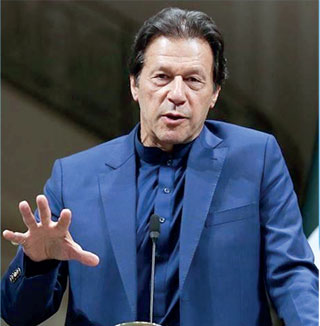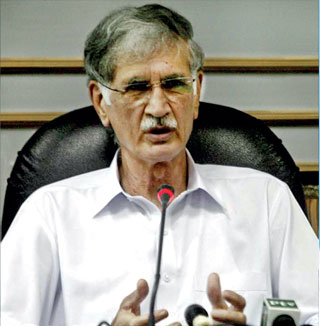Wednesday Feb 25, 2026
Wednesday Feb 25, 2026
Saturday, 11 December 2021 00:10 - - {{hitsCtrl.values.hits}}

Priyantha Kumara Diyawadana

Pakistani Prime Minister Imran Khan

Pakistani Defence Minister Pervez Khattak
|
 Inferno of burning faith
Inferno of burning faith
Pakistanis will always be a poor, exploited, miserable population where fighting over religion and ethnicity will be the norm. The country can never extricate itself from this deeply inward and backward world view that most of its leaders and people hold as sanctity.
Sialkot was a dramatic reminder of a grim reality that has grabbed the nation. Very specifically, unless a cosmopolitan educated leader like Imran Khan makes a revolution, Pakistan, unless on guard, will consume itself in the inferno of the faith that in the very first place created the nation.
Due to its strategic location, its nuclear capability, and its influence over Islamic extremism, the country will live by periodic bail -out dollars from the US and China, taking turns. Like in current Sri Lanka, that would be a hand-to-mouth existence with poverty growing by the hour. But our island hasn’t even that clout except a marginally strategic location in the Indian Ocean.
Religion consumes the State
Pakistan was created over religious differences and it built its constitution and body politic on the basis that it was going to be an Islamic state. There isn’t any space for the separation of church and state, which is crucially important for progressive development. Everybody has to pretend to be religious even if he simply isn’t – although the numbers of pretenders are insignificant in that country.
A fertile ground for the Taliban, which is said to be powerful in the background with many cadres in the army itself. Although not the same as the Afghanistan idiocy the Pakistan Talban cannot be ignored by the government establishment. As poverty burgeons faith’s power as the redeeming force grows. This is why I think that despite Imran’s great moves so far, the latter will find it extremely difficult to punish the wrong doers.
Imran Khan
Imran is an absolutely decent and cultured leader with an Oxford education and appears the last chance for Pakistan. He stands as a star, a model for Lanka’s rotten political leaders who are cheating humbugs. His world view is cosmopolitan and humanistic. He has led by supreme example so far – unlike the Lankan leaders.
This became first evident when he built a whole cancer hospital in memory of his mother. Mind you, that wasn’t at Government expense but at his own expense. That tells a great deal about the character of the man.
His prompt action with regard to Prasanna also reveals his statesmanship and humanity – 300 plus suspects have been arrested, hundred thousand dollars have been given to the victim’s family in Sri Lanka, and Prasanna’s monthly salary is also to be given continuously to the family.
Miracle
On the other hand it would be a miracle if Imran Khan can change Pakistan. The broad mass of the population are slaves to religion, of which they are happy to give an extreme interpretation. The more radical the system of beliefs the more they could be converted to the greatest happiness of the greatest number.
Just take a close look at the description given in by journalist Zaid Hussein in the Pakistan’s Daily, Dawn (8/12) of the mass-scale lynching of Prasanna for having removed an old poster of the Prophet from a wall that was being rebuilt:
“The attackers were all young. Many of those who watched the gruesome spectacle were teenagers. No one showed any sense of shock at the bestiality that was taking place. Several were busy filming the ghastly scene rather approvingly. There was not even a feeble voice of protest when the attackers set on fire the body of the dead Sri Lankan factory manager. The crowd that had gathered seemed immune to the grisly nature of the crime. The fury of the attackers was frightening. Some of them might be punished but it is the impunity for rising religiously inspired violent extremism that will keep producing tragedies like Sialkot.”
Zahid Hussein points out how the Pakistani Defence Minister Pervez Khattak tried to make light of the offence by stating in public that the mob had been driven by their “youthfulness and emotion”. Zaid states that this seems to represent the mindset of many persons in the hierarchy of the party itself.
Continues Zaid Hussein: “Our youth has been growing up watching murderers like Mumtaz Qadri being hailed as a great Muslim hero. His larger-than-life portraits are seen in marketplaces. Lawyers and even a retired high court judge were among those supporting him during his trial. Hundreds of thousands of people attended his funeral and his grave in Islamabad’s suburbs has been turned into a shrine.
“How can one forget a PTI provincial minister visiting Qadri’s grave? The video of him paying homage to the man who killed the Punjab governor went viral on social media. There appears to have been no questioning of this act by the party leadership. The Defence Minister’s comments represent the same mindset. There may be many others in the ruling party ranks with the same views on such violent incidents.
“A few years ago, the country had witnessed the gruesome murder of a young university student by his classmates on campus. Falsely accused of blasphemy, Mashal Khan was beaten and shot to death because of his views. Even some university administration members were accused of inciting the students. The courts freed many of the suspects. Their release was celebrated. The shock over the grisly incident soon vanished. Meanwhile, there is hardly any talk about how a Christian couple was thrown alive into a furnace on baseless charges of blasphemy.
“This year, a temple was vandalised after allegations of a seminary being desecrated by a Hindu child. Just a few days before the Sialkot lynching, a mob set on fire a police station in Charsadda for sheltering a mentally disturbed man suspected of committing blasphemy. The mob wanted to burn him alive. Many other cases of violence against the Ahmadi community go unreported.” End of quote
Radicalising of society by faith
All this this demonstrates the widespread radicalistion of society in Pakistan. What happened in Sialkot demonstrates the radicalisation of a society that condones violence in the name of faith. Society in Pakistan is socialised to consider such gruesome acts as “normal”. It would have been entertaining and “holy” television material for many TV viewers.
Slippery slope
Here is the root of the danger of faith-based beliefs – any faith: Faith is believing in something without any evidence and even despite contradicting religion. In the circumstance, when objective evidence isn’t there, such a believer steps into a slippery source where he could easily and even not very consciously cause harm on the basis of an expanded delusion. A rational individual who accepts only on firm objective evidence out there in public will never be automated to act that way; his mental guards are there holding on to his conscience.
Twin Towers
The famous attack on the Twin Towers in the USA on 9/11 was that. There may have been geopolitical factors in the background but the attackers themselves were driven by the illusory vision of fast-tracking themselves to heaven if that job was done. They were destroying the ‘blasphemers’ of their God. Anything is worth if that takes you to heaven (I don’t know about the virgins).
To such credulous minds a fundamentalist version of the religion becomes relishing; the more radical the more satiating. This is the psychological point where fundamentalism in Islam and other religions are sourced.
Other religions
We have observed historically this slippery slope phenomenon occurring in other brands of faith or even brands within brands like Shia and Sunni.
Reputed as the world’s most peaceful religion even the Buddhist religion has over the past few decades demonstrated the slippery slope to extremism. But the Buddhist version is mixed with ethnic differences often as we see in Myanmar and Sri Lanka.
Christianity in the Middle Ages did amply evince the drift to extremism driven by the slippery slope of faith. When faith has no moorings in objective reality well anything distance is possible. Christianity no longer condones this kind atrocity. The modern consciousness has transformed Western society altogether and religiosity is also observed sharply declining in those regions.
Richard Dawkins, the famous science writer and atheist, has sold millions of copies of his books (including ‘God Delusion’) and is seen making public speeches on what the Pakistanis have treated as blasphemy.
This notion of blasphemy
What sense does this notion of blasphemy make? How is it that one is free to question the claims of any science but not free to challenge claims of faith? Why treat religion alone with privilege?
Religions make claims that contradict scientific evidence. In the days of pre-science theologians had been allowed to and the latter were looked upon as the purveyors of knowledge. However, to their doom, the Renaissance brought scientific thinking to the forefront. The scientific method of search is rooted in objective evidence out there for all to see. Claims are validated or invalidated in reference to observable evidence. The scientist always keeps an open mind, ready to change or abandon previous theories in the event that new evidence that contradicts them arises. This is why there are constant challenges to scientific findings. These aren’t treated as ‘blasphemy.’
Almost all ‘truths’ about the universe and our existence enunciated in theology texts have been banished by science. The religious claim for creation is a foremost illustration among a whole big list of illustrations. If Charles Darwin lived today and accidentally landed in a country like Pakistan he would have been lynched. So are the other religious claims for a heaven, a God or an afterlife.
How come one isn’t allowed to make counter claims without being made guilty of the crime of blasphemy?
Blasphemy in Buddhism?
I have pointed out in an earlier piece how the Sri Lanka Penal Code leaves room for any criticism of religion as an “insult” to that religion. These provisions are barbaric and, what is more, they are practically applied only in relation to Buddhism. The Buddha himself had been so enlightened to encourage others to question his teachings. The Kalama Sutta is a kind of charter of freedom of thinking and expression.
Yet radicals in Sinhala-Buddhist society seem to be busy trying to bring in blasphemy as a crime against Buddhism. Just like the ones in Pakistan and similar societies, these people have converted a rational philosophy of open-mindedness into a faith and, as we have seen, faith leaves space for any gruesome act.
Conclusion
The offence of blasphemy is the culmination of a process in faith that has gone wrong as is seriously detrimental to human progress and welfare. It is the justification for all that happens on the slippery slope.
(The writer can be reached via [email protected])